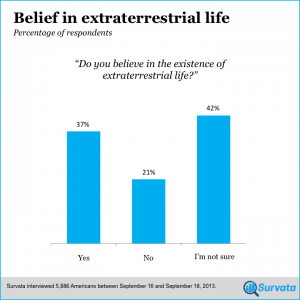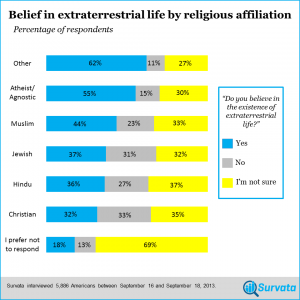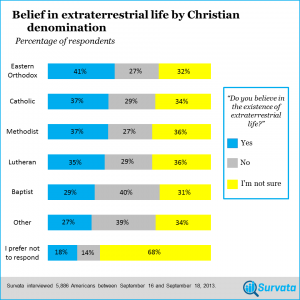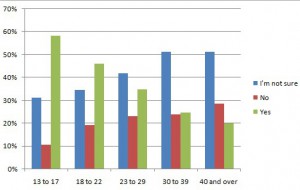A new survey shows that atheists and agnostics are 76% more
likely than Christians to believe in the existence of extraterrestrial
life. Overall 37% of those surveyed were willing to say they believed in
the existence of extraterrestrial life, only 21% said they did not
believe. However, most people (42%) were reticent to commit either way
saying the just aren’t sure.
The survey was conducted by Survata, a market research company. The results were shared on a blog posting on the Survata website, and it points out that throughout history scientific discovery has often been at odds with religious doctrine.

In modern times NASA seems to be getting closer to the discovery of extraterrestrial life with programs such as the Mars rover and Kepler telescope. The likelihood of extraterrestrial life is rising with each new discovery. Some feel that if the discovery of life is just around the corner, this may be an issue for religious dogma.
A new book titled Science, Religion, and the Search for Extraterrestrial Intelligence, by Theologian and Professor David Wilkinson, tackles these problems. He says Christian theologians are currently philosophizing about these issues, and the relationship between science and religion is “more subtle and fruitful than just conflict.”
Survata decided they could help shed some light on how religious affiliation relates to belief in extraterrestrial life with their survey. They polled 5,886 Americans, asking them “Do you believe in the existence of extraterrestrial life.”
Survata also asked the participants their religious affiliation. Of those who chose Atheist/Agnostic, 55% said they did believe in the existence of extraterrestrials. Interestingly, of those who chose “other” for religious affiliation, 62% said they believe in extraterrestrial life, the group with the highest percentage with that answer.

The religious group with the highest percentage that believes in extraterrestrial life was the Muslims at 44%. The Jewish and Hindu groups were similar in their percentage of believers, 37% and 36% respectively. Christians had the lowest percentage for the belief in extraterrestrial life at 32%. However, the lowest group was those who did not wish to share their religious affiliation. Only 18% of this group believes extraterrestrials exist.
Even though the number of believers varied, the number of people who were not sure was pretty constant at about 30%. The variances came with those who said they outright did not believe extraterrestrials exist. This category ranged from 15% among atheist/agnostics to over 30% for Christians and Jews.

Survata also provided a graph outlining the differences between Christian denominations. Christians were the largest religious affiliation with a little over 2200 participants. Baptists were the least likely to believe in the existence of extraterrestrials, at 29% in the affirmative and 39% in the negative. The other denominations were fairly close at about 30% not believing in ET and 35% to 40% in the affirmative.
Survata’s website has a tool that lets you drill down into the data a bit more. When I looked into gender variances, there was little difference. However, age differences were significant. Younger participants answered the question nearly completely opposite those in older groups. Among the 13 to 17 group, 58% said they believed in extraterrestrial life, only 11% said no, and 31% were unsure. However, the 40 plus group had nearly a third as many believers with only 20% saying they believed in extraterrestrial life. 30% said they flat out did not believe in extraterrestrial life, and a large number (51%) said they were unsure.

Although the news is full of stories related to discovering new planets that may be hospitable to life and life here on earth existing in places we never thought it could, many seem to be a bit more careful before committing to a belief that life outside of the planet exists.
Wilkinson, who has served as a Methodist chaplain and also has a PhD in astrophysics, has little doubt himself. He says, “If every star has planets around it, and we’re beginning to think most do, and there are 100 billion stars in 100 billion galaxies, surely there must be another Earth-like planet out there and surely there must be other life.”
The Huffington Post and YouGov also did a recent poll on extraterrestrials, although it focused on UFOs. They asked whether the participants believed that “some people have witnessed UFOs that have an extraterrestrial origin.” Their findings were a bit shocking, 48% answered in the affirmative and 35% in the negative. They had a smaller sample size at 1000 participants.
When they broke down the numbers they also found little differences between the genders. However, their political affiliations were interesting. They found, “from a political perspective, the ET believer camp reveals 58 percent to be Democrats, 47 percent Independents and 37 percent Republicans.” Given Survata’s findings, and the perception that Republicans are more often Christian, this may shed more insight into why people believe what they do.
The Survata survey demonstrates a belief in God may shade a person’s belief in extraterrestrial life. However, Wilkinson demonstrates that theology and science can come together to forge a shared understanding of reality that allows them both to exist. This may be even more imperative given that the younger generation appears to already be incorporating our extraterrestrial neighbors into their belief systems.
Source
The survey was conducted by Survata, a market research company. The results were shared on a blog posting on the Survata website, and it points out that throughout history scientific discovery has often been at odds with religious doctrine.

In modern times NASA seems to be getting closer to the discovery of extraterrestrial life with programs such as the Mars rover and Kepler telescope. The likelihood of extraterrestrial life is rising with each new discovery. Some feel that if the discovery of life is just around the corner, this may be an issue for religious dogma.
A new book titled Science, Religion, and the Search for Extraterrestrial Intelligence, by Theologian and Professor David Wilkinson, tackles these problems. He says Christian theologians are currently philosophizing about these issues, and the relationship between science and religion is “more subtle and fruitful than just conflict.”
Survata decided they could help shed some light on how religious affiliation relates to belief in extraterrestrial life with their survey. They polled 5,886 Americans, asking them “Do you believe in the existence of extraterrestrial life.”
Survata also asked the participants their religious affiliation. Of those who chose Atheist/Agnostic, 55% said they did believe in the existence of extraterrestrials. Interestingly, of those who chose “other” for religious affiliation, 62% said they believe in extraterrestrial life, the group with the highest percentage with that answer.

The religious group with the highest percentage that believes in extraterrestrial life was the Muslims at 44%. The Jewish and Hindu groups were similar in their percentage of believers, 37% and 36% respectively. Christians had the lowest percentage for the belief in extraterrestrial life at 32%. However, the lowest group was those who did not wish to share their religious affiliation. Only 18% of this group believes extraterrestrials exist.
Even though the number of believers varied, the number of people who were not sure was pretty constant at about 30%. The variances came with those who said they outright did not believe extraterrestrials exist. This category ranged from 15% among atheist/agnostics to over 30% for Christians and Jews.

Survata also provided a graph outlining the differences between Christian denominations. Christians were the largest religious affiliation with a little over 2200 participants. Baptists were the least likely to believe in the existence of extraterrestrials, at 29% in the affirmative and 39% in the negative. The other denominations were fairly close at about 30% not believing in ET and 35% to 40% in the affirmative.
Survata’s website has a tool that lets you drill down into the data a bit more. When I looked into gender variances, there was little difference. However, age differences were significant. Younger participants answered the question nearly completely opposite those in older groups. Among the 13 to 17 group, 58% said they believed in extraterrestrial life, only 11% said no, and 31% were unsure. However, the 40 plus group had nearly a third as many believers with only 20% saying they believed in extraterrestrial life. 30% said they flat out did not believe in extraterrestrial life, and a large number (51%) said they were unsure.

Although the news is full of stories related to discovering new planets that may be hospitable to life and life here on earth existing in places we never thought it could, many seem to be a bit more careful before committing to a belief that life outside of the planet exists.
Wilkinson, who has served as a Methodist chaplain and also has a PhD in astrophysics, has little doubt himself. He says, “If every star has planets around it, and we’re beginning to think most do, and there are 100 billion stars in 100 billion galaxies, surely there must be another Earth-like planet out there and surely there must be other life.”
The Huffington Post and YouGov also did a recent poll on extraterrestrials, although it focused on UFOs. They asked whether the participants believed that “some people have witnessed UFOs that have an extraterrestrial origin.” Their findings were a bit shocking, 48% answered in the affirmative and 35% in the negative. They had a smaller sample size at 1000 participants.
When they broke down the numbers they also found little differences between the genders. However, their political affiliations were interesting. They found, “from a political perspective, the ET believer camp reveals 58 percent to be Democrats, 47 percent Independents and 37 percent Republicans.” Given Survata’s findings, and the perception that Republicans are more often Christian, this may shed more insight into why people believe what they do.
The Survata survey demonstrates a belief in God may shade a person’s belief in extraterrestrial life. However, Wilkinson demonstrates that theology and science can come together to forge a shared understanding of reality that allows them both to exist. This may be even more imperative given that the younger generation appears to already be incorporating our extraterrestrial neighbors into their belief systems.
Source
No comments:
Post a Comment
Note: Only a member of this blog may post a comment.